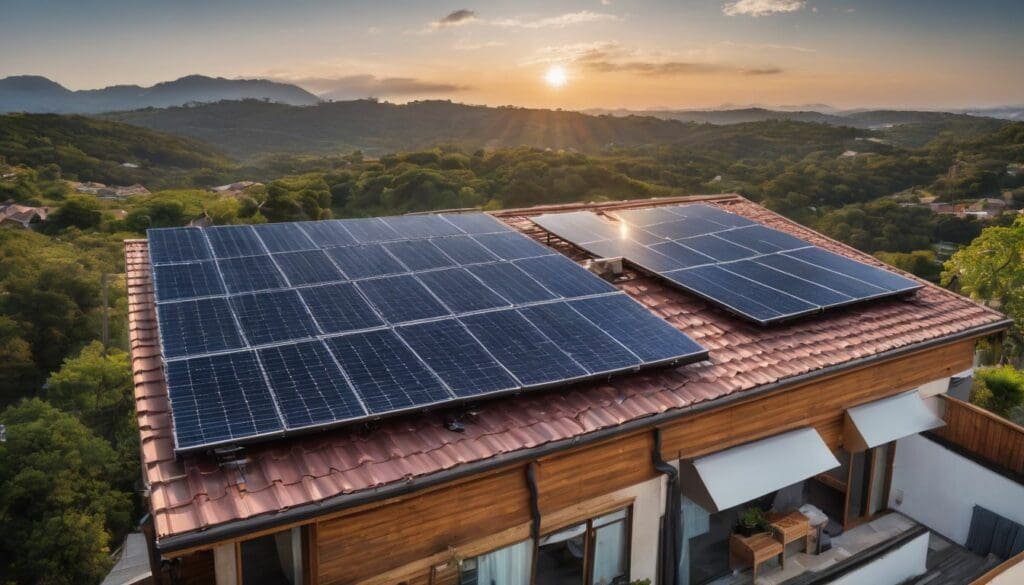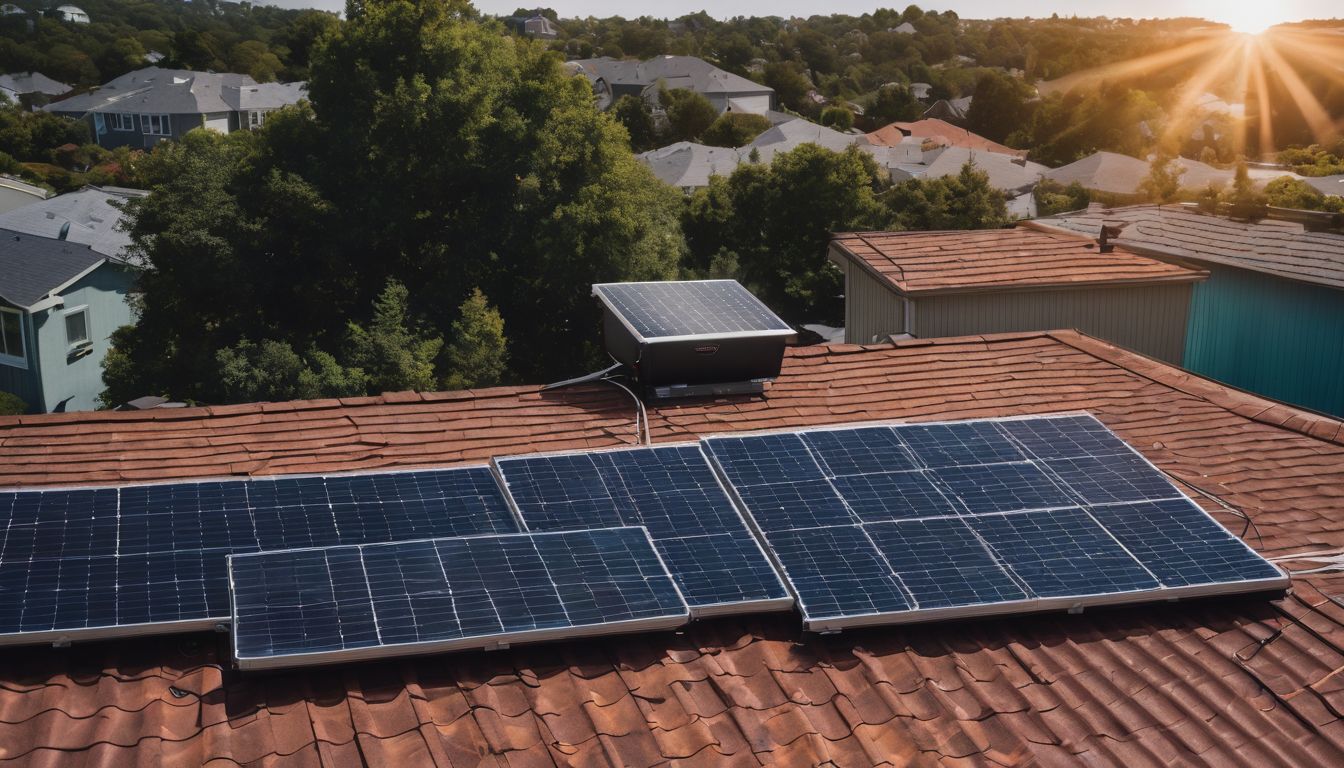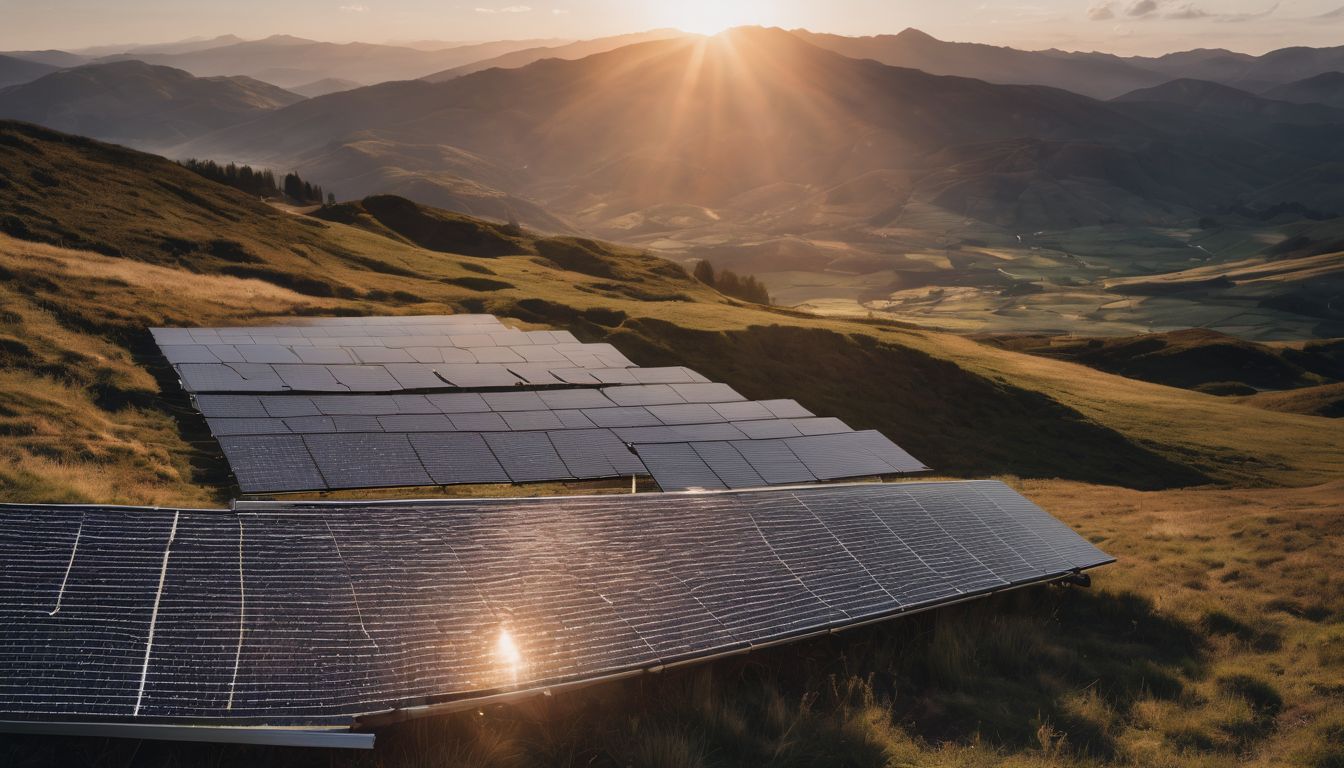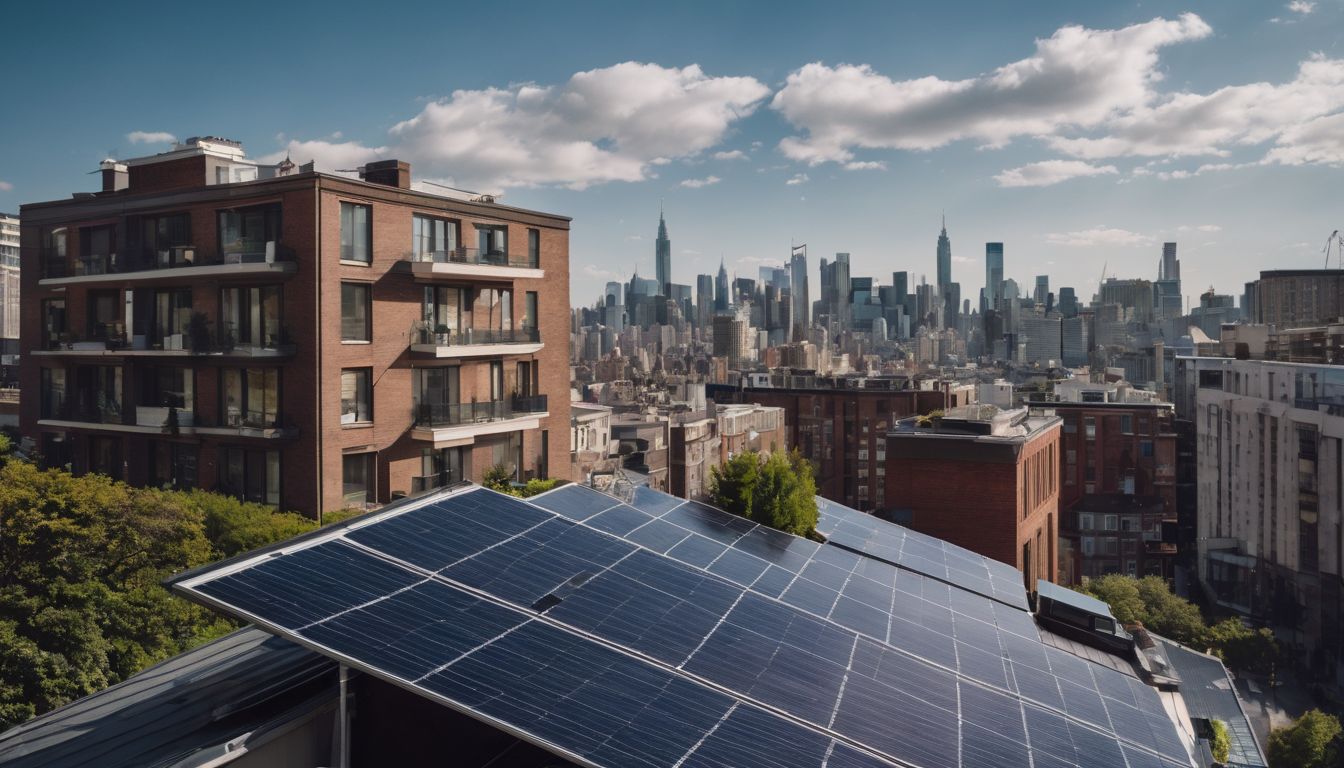Are your energy bills through the roof? In the UK, solar panels can slash those costs significantly. We’ll explore how harnessing the sun’s power is not just good for the planet—it makes sound financial sense too.
Discover if solar could be your smartest investment yet!
Key Takeaways
- Solar panels can reduce your energy bills and earn money through the UK’s Feed – in Tariff scheme by selling excess energy back to the grid.
- Government incentives like the Smart Export Guarantee can make installing solar panels more affordable, encouraging homeowners to contribute to a sustainable future.
- The suitability of your property for solar panel installation depends on factors including roof orientation and angle, shading, structural integrity, and personal energy usage patterns.
- The initial cost of installing solar panels is offset by long – term savings on electricity bills, increased property value, and potential income from generated energy.
- Advances in solar technology and continued investment are likely to increase the efficiency of solar panels in the UK, helping meet environmental goals while benefiting homeowners economically.
Economic Benefits of Solar Energy
Aside from reducing electricity bills, solar energy can also help homeowners earn money through Feed-in Tariffs and increase their property value.
Reduced electricity bills
Solar panels significantly slash your monthly energy expenses by harnessing the sun’s power to generate free electricity for your home. After installing photovoltaic systems, many households notice a dramatic drop in their electricity bills, as they become less dependent on the grid.
Cutting down on traditional energy consumption not only saves money but also reduces your carbon footprint, making it an economic and environmentally friendly choice.
As solar panel technology advances, these renewable energy sources become more efficient and capable of generating more power from the same amount of sunlight. By shifting towards green energy with solar panels, you lock in lower rates for your future electricity needs.
This decision ensures that while traditional electricity costs might rise due to market changes or resource scarcity, your finances remain protected against such fluctuations thanks to solar power savings.
Earn money through Feed-in Tariffs
Feed-in Tariffs enable you to earn money by generating your own solar electricity. By selling the excess energy back to the grid, you can receive payments from energy suppliers. This provides an additional source of income while contributing to a more sustainable and environmentally friendly energy landscape.
Embracing this opportunity aligns with conservation efforts and supports the UK’s renewable energy goals.
Moving forward, let’s delve into the factors affecting the break-even point when installing solar panels, considering aspects such as location and smart export guarantee rates.
Increase property value
Installing solar panels can increase the value of your property, making it more attractive to potential buyers. Solar energy systems are seen as a desirable feature by homebuyers looking for energy-efficient and sustainable properties.
The added benefit of reduced electricity bills and potential income from Feed-in Tariffs enhances the appeal of your property while contributing to a greener environment.
By harnessing solar power, homeowners not only enjoy cost savings but also contribute to reducing carbon emissions, making their properties more environmentally friendly. An investment in solar panels can boost the marketability and overall value of your property in the long term.
Factors Affecting the Break-Even Point
Location and solar battery usage can impact the break-even point of solar panel installation, as well as the Smart Export Guarantee rate and electricity usage and pricing. These factors play a crucial role in determining the financial benefits of investing in solar energy.
Location
The location of your property plays a crucial role in the efficiency of solar panels. The amount of sunlight your panels receive directly affects their energy production. Properties in sunnier regions like the South East and South West of the UK are likely to generate more electricity than those in areas with less sunshine, such as Scotland or the North East.
It’s essential to consider your property’s location when assessing the potential benefits and returns from installing solar panels.
Optimising for maximum sunlight exposure is vital for ensuring that your investment in solar panels yields significant energy savings and potential income through Feed-in Tariffs or Smart Export Guarantee rates.
Smart Export Guarantee rate
The Smart Export Guarantee rate is a crucial factor to consider when evaluating the financial benefits of installing solar panels. This rate determines how much money you can earn by selling any excess energy your solar panels generate back to the grid.
The higher the Smart Export Guarantee rate, the more potential income you can receive for your exported renewable energy. It’s essential to research and compare different energy suppliers’ rates to maximise your earnings and ensure that your investment in solar panels pays off over time.
By understanding and keeping track of the Smart Export Guarantee rate, environmentally conscious individuals can make informed decisions about investing in solar panel installations while contributing to sustainable energy production.
Solar battery
Solar battery technology has advanced, making it an essential component for maximising the benefits of solar energy. With a solar battery, excess energy generated during the day can be stored and used during peak times or when sunlight is unavailable.
This helps reduce reliance on the grid and maximises self-consumption of clean, renewable energy.
Solar batteries like lithium-ion ones are becoming more affordable and efficient, allowing homeowners to further cut their electricity bills by harnessing their solar power around the clock.
Electricity usage and pricing
To maximise the benefits of your solar panel investment, it’s crucial to be mindful of your electricity usage and pricing. Understanding your household’s energy consumption patterns can help in determining the ideal size for your solar panel system.
By knowing when you use the most electricity, you can align it with peak sunshine hours to maximise savings on utility bills. Additionally, keeping an eye on electricity pricing trends and tariffs will aid in making informed decisions about generating and consuming solar power efficiently.
When considering solar panels, being aware of changes in electricity usage habits is key to achieving long-term savings and optimal financial return from renewable energy generation.
Cost of Solar Panels
When considering the cost of solar panels, it’s important to take into account the initial installation costs and the long-term savings that can be achieved. Government incentives and schemes also play a role in making solar panel installation more affordable and attractive for homeowners.
Initial installation costs
Installing solar panels comes with an initial installation cost, but these costs have significantly decreased in recent years. The government incentives and grants available in the UK also help reduce the initial financial outlay.
Plus, considering the long-term savings on electricity bills and potential earnings through Feed-in Tariffs, investing in solar panels can offer a strong return on investment over time.
It’s important to consider all these factors when evaluating the initial installation costs of solar panels, as they play a crucial role in determining the overall economic benefits and viability.
Long-term savings
Solar panels offer long-term savings by significantly reducing or even eliminating electricity bills. The initial investment in solar panels can be offset over time, as the energy generated from the sun is free and abundant.
Additionally, homeowners may benefit from government incentives and Feed-in Tariffs to further enhance their long-term savings potential.
For those considering solar panel installation, understanding the long-term financial benefits is crucial. By factoring in reduced electricity bills, potential earnings through feed-in tariffs, and government incentives, it becomes clear that investing in solar energy presents a compelling opportunity for sustainable and cost-effective living.
As the demand for renewable energy continues to rise, embracing solar power offers not just economic advantages but also contributes towards environmental conservation efforts.
Government incentives
The UK government offers various incentives to encourage the installation of solar panels. Homeowners can benefit from the Smart Export Guarantee scheme, which allows them to sell excess energy back to the grid.
Additionally, there are grants and subsidies available for those looking to invest in renewable energy sources. These incentives aim to make solar panel installation more accessible and cost-effective for households, further promoting environmental sustainability and reducing carbon emissions.
By taking advantage of government incentives, homeowners can not only save on their electricity bills but also contribute towards a greener and more sustainable future for the UK.
Is Your Property Suitable for Solar Panels?
Considerations for suitability include the orientation and angle of your roof, the amount of shading on your property, and the structural integrity to support the panels. Investing in solar panels can also increase property value and contribute to environmental sustainability goals.
Considerations for suitability
To determine if your property is suitable for solar panels, consider the following:
- Roof Direction and Angle: The ideal roof direction is south-facing to maximise sun exposure. A pitch between 30-45 degrees is optimal for solar panel installation.
- Shading: Ensure there are no nearby obstructions such as tall trees or buildings that cast shadows on the roof during peak sunlight hours.
- Roof Condition: The structural integrity of the roof should be assessed to ensure it can support the weight of solar panels and withstand their installation.
- Property Ownership: If you own the property, you have full control over installing solar panels, while leasehold properties may require permission from landlords or management companies.
- Planning Permission: Check if planning permission is required in your area before proceeding with installation to avoid any legal complications.
- Energy Usage Patterns: Analyse your energy consumption patterns to determine if your property can benefit from the electricity generated by solar panels.
- Environmental Impact: Consider the positive environmental impact of reducing carbon emissions and contributing to renewable energy generation in your decision-making process.
Impact on property value
Solar panels can significantly increase the value of your property. The prospect of reduced energy bills and potential income from Feed-in Tariffs enhances the appeal of your property to future buyers.
Research indicates that homes with solar panels are more attractive to environmentally-minded individuals, thus positively affecting property marketability.
The installation of solar panels increases the energy efficiency and sustainability of your home, aligning it with modern environmental standards. This adds further value to your property, making it an appealing investment for potential buyers who prioritise sustainable living and long-term cost savings on their utility bills.
Future Outlook for Solar Panels in the UK
The future outlook for solar panels in the UK looks promising, with potential for improved investment and technological advancements. This will not only help meet environmental and sustainability goals but also offer long-term benefits to homeowners and the economy as a whole.
Potential for improved investment in the future
Solar panel technology continues to advance, offering the potential for improved investment in the future. As new developments make solar panels more efficient and affordable, property owners can expect higher returns on their initial investments.
Moreover, with ongoing government support and increased public awareness of environmental issues, the demand for renewable energy sources like solar power is set to rise. This presents an opportunity for individuals to not only contribute to a greener environment but also secure long-term financial benefits through solar panel installations.
In addition to the financial gains, investing in solar panels aligns with sustainability goals and reduces reliance on non-renewable energy sources. As green technology becomes increasingly mainstream, properties equipped with solar panels are likely to gain higher market value while making a positive impact on the environment.
Impact on environment and sustainability goals
Solar panels contribute significantly to environmental and sustainability goals. By harnessing sunlight to generate electricity, solar power reduces reliance on fossil fuels, thereby cutting carbon emissions.
This clean energy source plays a pivotal role in combatting climate change and promoting renewable energy solutions. Additionally, by investing in solar panels, individuals actively participate in the global effort towards a greener future and contribute to building a more sustainable environment for future generations.
Moreover, integrating solar panels into homes promotes a shift towards efficient use of natural resources while driving innovation and investment in the renewable energy sector. The adoption of solar power also aligns with government initiatives aimed at reducing carbon footprints and transitioning to cleaner energy sources such as photovoltaic technology.
Other benefits of solar energy
Solar energy also offers the advantage of reducing greenhouse gas emissions, contributing to a healthier environment. By harnessing solar power, homeowners can decrease their reliance on non-renewable energy sources and help combat climate change.
Furthermore, solar panels require minimal maintenance, reducing the overall environmental impact compared to traditional energy sources.
Another benefit is the independence it provides from fluctuating electricity prices. With solar panels, individuals have more control over their energy production and consumption, shielding them from rising utility costs in the long run.
This not only provides financial stability but also contributes to a greener future for generations to come.
Conclusion
Investing in solar panels in the UK offers economic benefits, including reduced electricity bills and potential earnings through Feed-in Tariffs. Factors such as location, Smart Export Guarantee rates, and your property’s suitability play a significant role in determining the break-even point.
While initial installation costs may seem steep, the long-term savings and government incentives make it a worthwhile investment. As the push for sustainability increases, solar energy presents an attractive option for environmentally conscious individuals looking to reduce their carbon footprint while saving on energy costs.
FAQs
1. How much does it cost to install solar panels in the UK?
In the UK, solar panel installation costs vary but investing in photovoltaic panels typically involves a significant initial outlay.
2. Are there any savings from installing solar panels?
Yes, by harnessing solar power, you can cut down on your electricity bills and increase your energy efficiency, leading to potential savings over time.
3. What incentives are available for solar panel installation in the UK?
The UK offers several solar panel incentives and government schemes that can help offset some costs and encourage renewable energy use.
4. Do I need to maintain my solar panels after installing them?
Maintenance is essential for keeping your photovoltaic panels running efficiently; luckily, ongoing upkeep tends to be minimal in the UK.
5. What makes investing in solar panels worth it economically?
Investing in solar energy not only reduces carbon emissions but also provides a solid return on investment thanks to reduced utility bills and various grants available.





